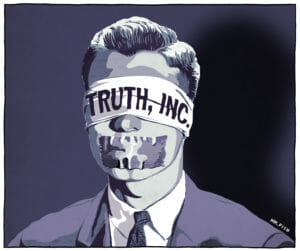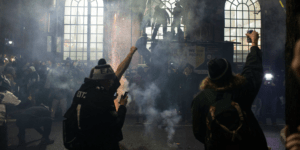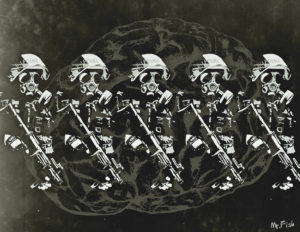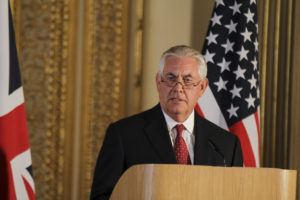‘Witch Hunt’: Fired MSNBC Contributor Speaks Out on Suppression of Israel-Palestine Debate (Video)
As the Gaza body toll mounts, NBC executives crack down on criticism of Israel.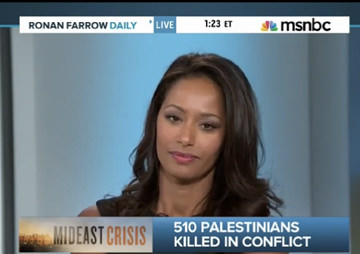
By Max Blumenthal, AlterNet
This piece originally ran on AlterNet.
MSNBC contributor Rula Jebreal’s on-air protest of the network’s slanted coverage of Israel’s ongoing assault on the Gaza Strip has brought media suppression of the Israel-Palestine debate into sharp focus. Punished for her act of dissent with the cancellation of all future appearances and the termination of her contract, Jebreal spoke to me about what prompted her to speak out and why MSNBC was presenting such a distorted view of the crisis.
“I couldn’t stay silent after seeing the amount of airtime given to Israeli politicians versus Palestinians,” Jebreal told me. “They say we are balanced but their idea of balance is 90 percent Israeli guests and 10 percent Palestinians. This kind of media is what leads to the failing policies that we see in Gaza.”
She continued, “We as journalists are there to afflict the comfortable and who is comfortable in this case? Who is really endangering both sides and harming American interests in the region? It’s those enforcing the status quo of the siege of Gaza and the occupation of the West Bank.”
Jebreal said that in her two years as an MSNBC contributor, she had protested the network’s slanted coverage repeatedly in private conversations with producers. “I told them we have a serious issue here,” she explained. “But everybody’s intimidated by this pressure and if it’s not direct then it becomes self-censorship.”
With her criticism of her employer’s editorial line, she has become the latest casualty of the pro-Israel pressure. “I have been told to my face that I wasn’t invited on to shows because I was Palestinian,” Jebreal remarked. “I didn’t believe it at the time. Now I believe it.”
An NBC producer speaking on condition of anonymity confirmed Jebreal’s account, describing to me a top-down intimidation campaign aimed at presenting an Israeli-centric view of the attack on the Gaza Strip. The NBC producer told me that MSNBC President Phil Griffin and NBC executives are micromanaging coverage of the crisis, closely monitoring contributors’ social media accounts and engaging in a “witch hunt” against anyone who strays from the official line.
“Loyalties are now being openly questioned,” the producer commented.
The suppression campaign culminated after Jebreal’s on-air protest during a July 21 segment on Ronan Farrow Daily.
“We are disgustingly biased on this issue. Look at how much airtime Netanyahu and his folks have on air on a daily basis, Andrea Mitchell and others,” Jebreal complained to Farrow. “I never see one Palestinian being interviewed on these same issues.”
When Farrow claimed that the network had featured other voices, Jebreal shot back, “Maybe for thirty seconds, and then you have twenty-five minutes for Bibi Netanyahu.”
Within hours, all of Jebreal’s future bookings were cancelled and the renewal of her contract was off the table. The following day, Jebreal tweeted: “My forthcoming TV appearances have been cancelled. Is there a connection to my expose and the cancellation?”
Jebreal is the author of Miral, a memoir about her coming of age in the Israeli-occupied West Bank. Her former partner, Jewish-American filmmaker and artist Julian Schnabel, adapted the book into full length film. A widely published journalist and former news presenter in Italy, Jebreal was a vocal supporter of the now-extinct peace process and a harsh critic of Islamist groups including Hamas. Her termination leaves NBC without any Palestinian contributors.
According to the NBC producer, MSNBC show teams were livid that they had been forced by management to cancel Jebreal as punishment for her act of dissent.
At the same time, social media erupted in protest of Jebreal’s cancellation, forcing the network into damage control mode. The role of clean-up man fell to Chris Hayes, the only MSNBC host with a reputation for attempting a balanced discussion of Israel-Palestine. On the July 22 episode of his show, All In, he brought Jebreal on to discuss her on-air protest.
In introducing Jebreal, Hayes took on the role of the industry and network defender: “Let me take you behind the curtain of cable news business for a moment,” Hayes told his viewers. “If you appear on a cable news network, you trash that network and one of its hosts by name, on any issue — Gaza, infrastructure spending, sports coverage, funny internet cat videos — the folks at the network will not take kindly to it.”
In fact, MSNBC Morning Joe co-host Joe Scarborough has publicly attacked fellow MSNBC hosts and slammed the network for its support for the Democratic Party.
“I did not think that i was stepping in a hornet’s nest,” Jebreal told me. “I saw Joe Scarborough criticizing the network. I thought we were liberal enough to stand self criticism.”
Yet when she appeared across from Hayes, Jebreal encountered a defensive host shielding his employers from her criticism. “We’re actually doing a pretty good job” of covering the Israel-Palestine crisis, Hayes claimed to her. “I think our network, and I think the New York Times and the media all around, have been doing a much better job on this conflict.”
Jebreal appeared on screen as a “Palestinian journalist” — her title as a MSNBC contributor had been removed. When she insisted that American broadcast media had not provided adequate context about the 8-year-long Israeli siege of the Gaza Strip or the roots of Palestinian violence, Hayes protested that he had wanted to host Hamas officials alongside the Israeli government spokespeople he routinely featured but that it was practically impossible.
“Not all Palestinians are Hamas,” Jebreal vehemently replied.
“Airtime always strikes me as a bad metric,” Hayes responded. “I mean there are interviews and then there are interviews. I had [Israeli government spokesman] Mark Regev on this program for 16 minutes, alright? That’s a very long interview but there was a lot to talk to him about.”
The NBC producer remarked to me that the network’s public relations strategy had backfired. Hayes’ performance was poorly received on social media while Jebreal appeared as another maverick journalist outcasted by corporate media for delivering uncomfortable truths.
For her part, Jebreal told me she was disturbed by Hayes’ comments. “I admire that Chris [Hayes] wanted to have me on but it seems like he was condoning what happened to me,” she said. “He was saying, ‘What do you expect? We rally around our stars.’ Well, I rally around reality, if that still matters in media.”
Jebreal continued: “I didn’t tell him this on air but I said, ‘I hope you don’t condone other things the network did, like what happened with Ayman.’”
Jebreal was referring to NBC correspondent Ayman Mohyeldin and his sudden removal by the network from the Gaza Strip. Mohyeldin, a rising star in the network and its only Arab-American reporter in the region, was an eyewitness to the Israeli killing of four young boys who had been playing soccer on a beach near Gaza City.
Moments after the killings, Mohyeldin relayed intimate accounts of the scene through Twitter, then released harrowing footage of the boys’ mother wailing as she learned of their deaths. Oddly, NBC correspondent Richard Engel was summoned to deliver Mohyeldin’s package that evening.
The NBC producer told me that the network was deluged with angry letters and phone calls from pro-Israel activists about Mohyeldin’s reporting.
Hours later, Mohyeldin’s summary of the US State Department’s statement defending Israel’s actions disappeared from his Facebook and Twitter accounts. He had apparently been forced to delete the postings. Next, NBC removed Mohyeldin from Gaza, sending him out of the area on the first plane available.
To replace Mohyeldin, NBC dispatched Engel, a veteran foreign correspondent well-liked by top brass and regarded as the network’s “star.” Engel was the keynote speaker at a 2013 event at the Newseum in Washington DC honoring journalists killed that year. Under Israel lobby pressure, the Newseum had removed the names of three Palestinian journalists killed in targeting Israeli strikes during the November 2012 assault on Gaza, accepting claims by anti-Palestinian groups like the Anti-Defamation League that their employment by Hamas-affiliated outlets rendered them enemy combatants. During his speech, Engel carefully avoided condemning the Newseum for its capitulation.
The removal of Mohyeldin sparked an international backlash, with tens of thousands from around the world protesting the decision through viral Twitter hashtags like, #LetAymanReport and #FreeAyman. Two days later, an apparently chastened NBC returned Mohyeldin to the Gaza Strip, but the damage had been done.
Unwilling to explain its unusual actions, NBC left it up to media critics to guess at its motives. CNN Reliable Sources host Brian Stelter chalked up the removal of Mohyeldin to “infighting and bureaucracy,” claiming that NBC was concerned primarily with ratings. Glenn Greenwald, the editor-in-chief of the The Intercept, wrote that Mohyeldin was ordered out of Gaza by David Verdi, a top NBC executive, for political reasons — his reporting was deemed too sympathetic to Palestinians.
The NBC producer insisted that Greenwald’s account was the more accurate one. “Greenwald was right,” the producer told me. “And I hate to say that.”
For her part, Jebreal does not expect to be welcomed back on MSNBC again. “I’m done there,” she told me. “It’s not happening any more. My contract is over. I’m fine with it. I’m not complaining.”
She cited the distorted coverage of Israel-Palestine in American broadcast as the central reason behind the American public’s support for Israel’s assault on Gaza.
“I believe this is a shifting moment in history and we need to make a decison,” Jebreal said. “It’s easier when there’s Bridgegate but there is another gate: This is Mediagate and we need to begin to challenge our responsibilities.”
Your support is crucial…With an uncertain future and a new administration casting doubt on press freedoms, the danger is clear: The truth is at risk.
Now is the time to give. Your tax-deductible support allows us to dig deeper, delivering fearless investigative reporting and analysis that exposes what’s really happening — without compromise.
Stand with our courageous journalists. Donate today to protect a free press, uphold democracy and unearth untold stories.


